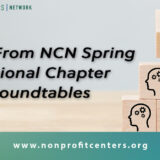What Values Should Guide Our Metro Region?
On April 18, 2017 more than 100 community leaders gathered at the Federal Reserve Bank of St Louis to advance a regional strategy for social purpose real estate (SPRE). Representatives from banking, community development, philanthropy, non-profit administration, government, and academia listened to national thought leaders, studied case examples, and reviewed the emerging landscape of projects in the St Louis region. Principles to guide SPRE and non-profit center development were identified through facilitated small group discussion. A consensus process across six teams resulted in adoption of the values and descriptions provided here. We share them with our peers across the nation in hopes of gaining feedback and to learn more about how other regions are holding themselves accountable to shared values as they implement social purpose real estate and non-profit colocation strategies.
community centered
Ultimately, a regional colocation strategy is not about real estate. It is about how real estate can help us create equitable communities. There is a significant difference between being located in the community and becoming a part of the fabric of a community.
- have a strong community engagement process
- remember, “nothing for us without us!”
- be responsive to local needs and vision
- create space in buildings for community life
- produce benefit and value for the community
relationship driven
Real estate ventures often focus on a negotiated set of transactions. Social purpose real estate is a carefully developed set of enduring relationships. To succeed, all parties must develop trust and work for shared community benefit.
- bring partners in from the beginning
- cultivate understanding of shared values
- take time and intentionally build trust
- work to maintain buy-in throughout
mission focused
Colocation must produce mission benefits. These benefits include, but extend well beyond, cost savings and efficiency. SPRE projects should work to strengthen non-profit organizations.
- focus on the desired mission benefits
- include supports that build capacity
- foster a culture of inquiry and improvement
equitable
Real estate investment and policy in the St Louis region has often perpetuated social injustice, division, and structural racism. By definition, SPRE seeks to reverse these trends and address these harms.
- be intentional about patterns of reinvestment
- treat co-locating non-profits equitably
- connect projects into a regional network
accountable
Mission benefits must be measurable and SPRE projects are accountable over time for measuring, producing, and reporting on these mission benefits.
- be explicit about the benefits to be produced
- invest in measurement and evaluation
- publically share what is learned
- be intentional about patterns of reinvestment
- treat co-locating non-profits equitably
- connect projects into a regional network
sustainable
Building community assets requires project leaders to think generationally. Architecture and infrastructure should focus on environmental sustainability.
- look for opportunities for historic preservation
- seek appropriate certification
Paul Evensen spoke at Sharing Innovation and is presenting a 3 part series of entries on his presentation topic: How Many Non-Profit Centers Do You Really Need? This is the first entry in the series.







